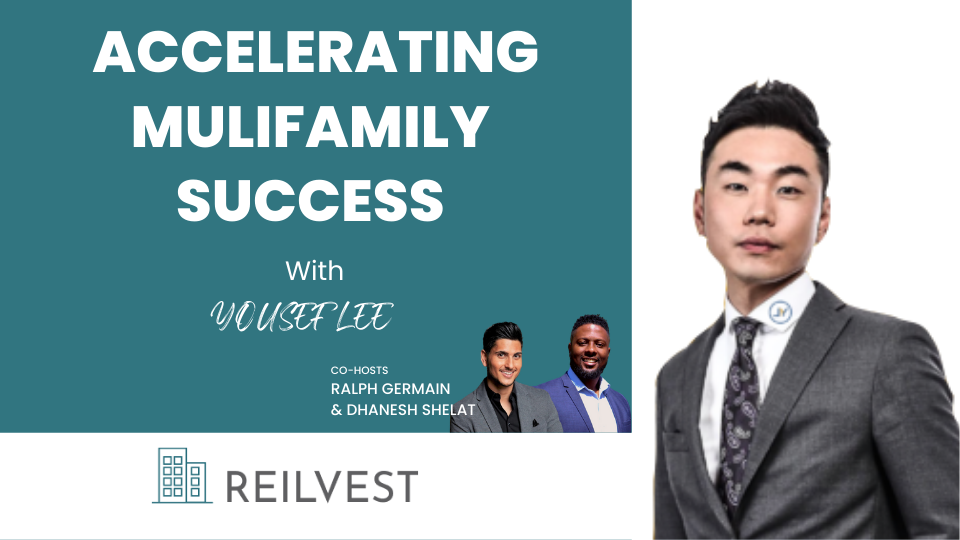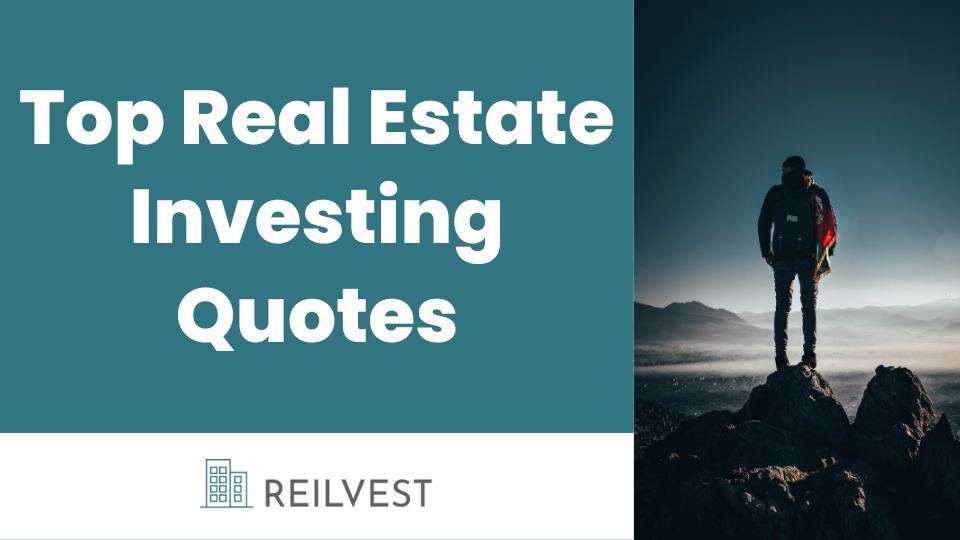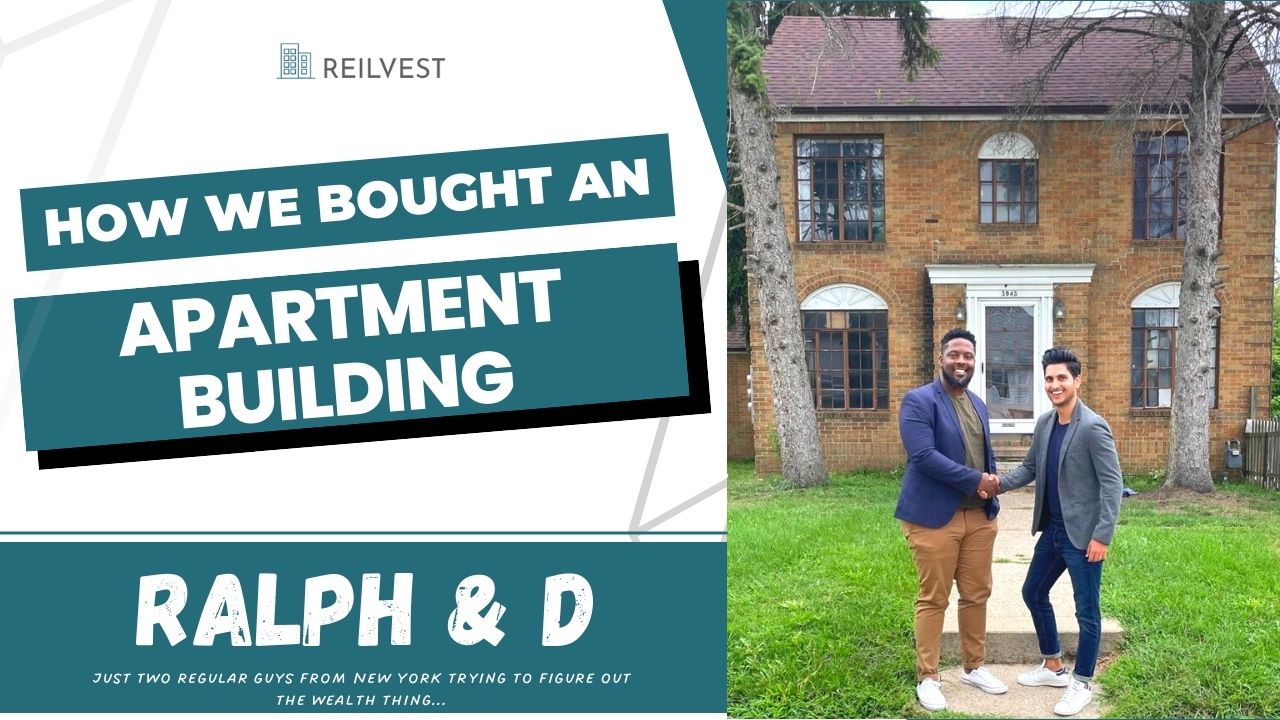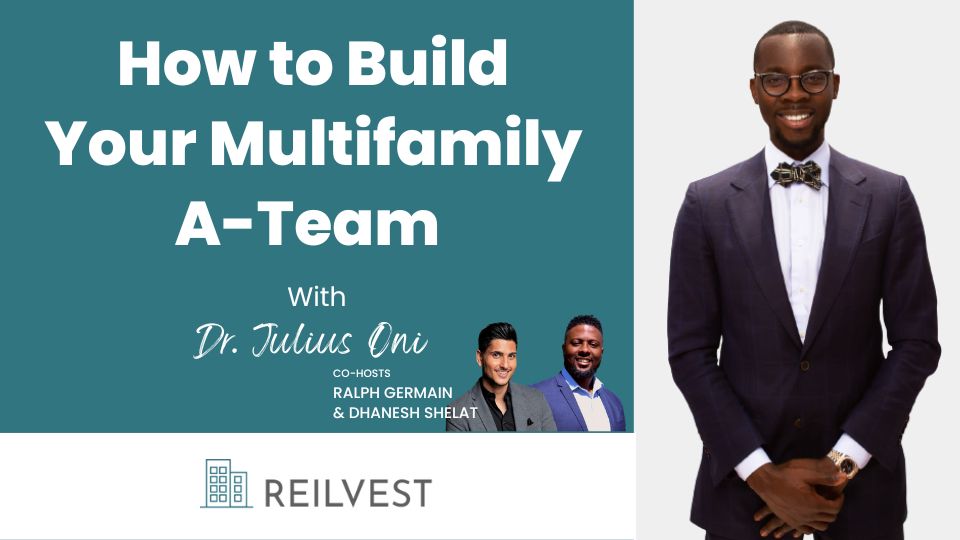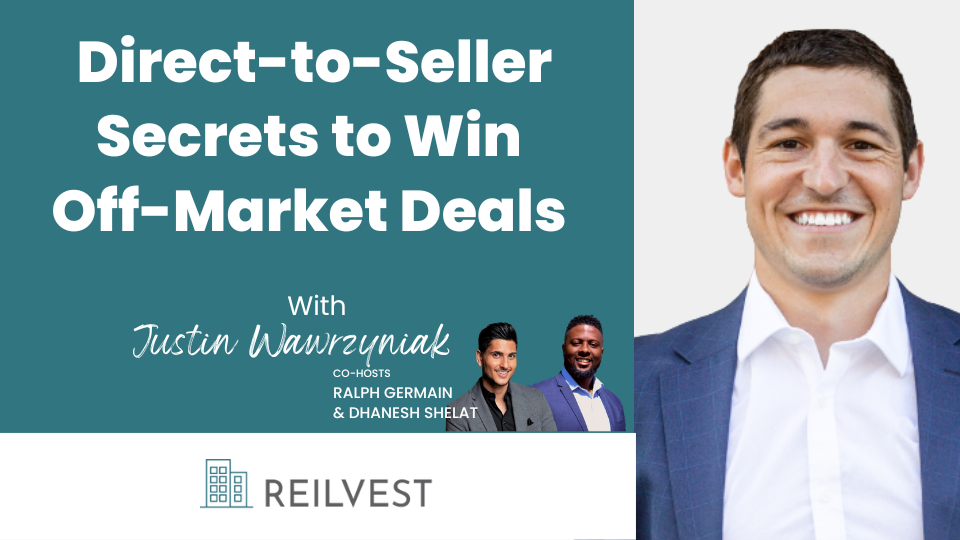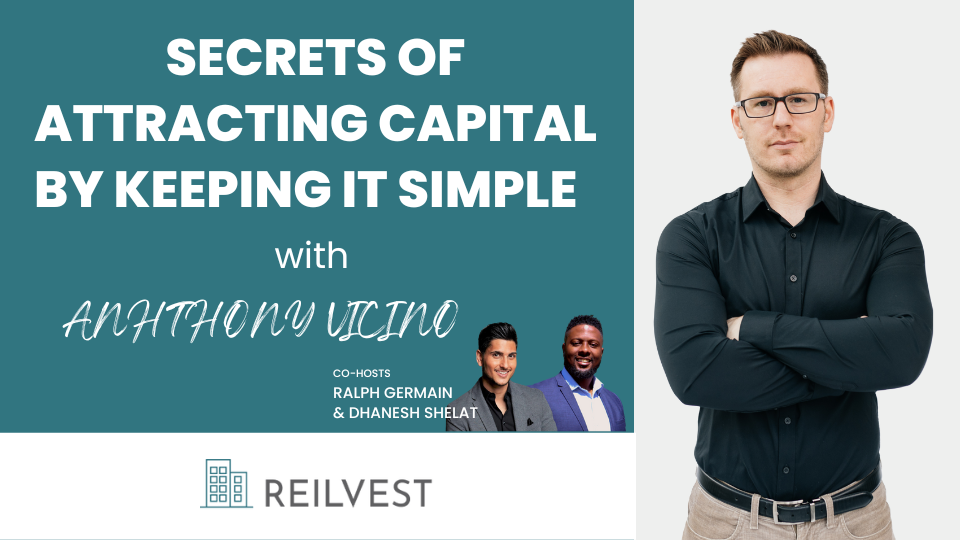Yosef Lee is a Multifamily Apartment Syndicator and Investor at Syndicro & Partners Capital. He is a believer, a South Korean immigrant, father of two beautiful girls, a lawyer from NYC, a people connector, a status-quo hater, strategic planner/action taker, pilates studio owner, and entrepreneur wannabe. He has the vision to take back the control of his T/P/O (Time, Place, and Occurrence) through acquiring cash-flowing multifamily apartments as a tool to create passive income streams and to achieve generational wealth. Check out the interview with Yosef:
TRANSCRIPT
Dhanesh Shelat (00:03):
Perfect. So, Ralph, who do we have today?
Ralph Germain (00:05):
Yeah, I’m very excited because he’s one of them, I guess, the most influential people I’ve met so far in this multifamily space who definitely inspires me and motivates me and is truly a one-of-a-kind gentleman. We have Yosef Lee. Yosef, your Brosef, and I’m going to read a quick short bio for Yosef, and then we’ll get started, but everybody, please welcome Yosef. Moving from South Korea at age 18, Yosef always strived to prove himself in a new country, from working multiple part-time jobs to becoming a full-time civil litigation lawyer. This father of two quickly learned to manage his time effectively. Yosef began his journey in multifamily, as a multifamily investor only in early 2022. So, it hasn’t even been that long yet, and wait till you hear how much he’s accomplished. Now, he impressively has several hundred units in his portfolio. So, everybody, help me welcome Yosef Lee real quick. Yosef, welcome.
Yosef Lee (01:08):
Thank you. Thank you, Ralph, for the intro and everyone. It’s great to see. This is my first, I think, virtual meetup attending early in the morning. It’s usually at night, and I know how hard it is to spare your time on Saturday morning, so, I thank you for making it here. A little bit about my background, as Ralph introduced, I’m a South Korean immigrant, currently a lawyer from New York City, still W-2, father of two kids aspiring to take back the control of my time by being financially free through multifamily apartment investing.
Yosef Lee (01:44):
So, I was a month shy of 18 years old when I landed in the U.S. It was just huge cultural excitement, but also at the same time, challenges, lifestyles, and languages, and I had to make new friends, et cetera. So, ever since, my life has been all about just proving myself in a new country, trying to be better every day as much as possible, achieving some goals, making many mistakes, paying the price but learning the lessons, and getting up and move on.
Yosef Lee (02:18):
Long story short, I became an attorney to make a partnership and just being a cool attorney in New York, being a rich guy, et cetera. However, the reality was my job is, by nature, trading my time for money. So, the more money I want to make, the more time I had to put, into more work hours. I thought about it for years, and then that was not the lifestyle that I wanted to pursue especially since my kids are growing up. They wanted more attention from me. So, and with a couple of other life events, I started thinking about what should I do and then came to the conclusion that I need to create some sort of sustainable other multiple income streams so that no matter what happens to me, God forbid, I have something to protect my kids, right? So, that is some sort of financial fortress for them, so no matter what they want to do so that they could have that support. So, I started studying a little about investment and having my own business. I stumbled upon the book Robert Kiyosaki, Rich Dad, and Poor Dad, and I know all of-
Ralph Germain (03:29):
Classic.
Yosef Lee (03:30):
The classic, right, but for a funny thing is that I had the book for more than 10 years. It was just sitting in there.
Ralph Germain (03:37):
Really?
Yosef Lee (03:38):
Never read it. My uncle gave it to me, and back then, it was like, what kind of scheme is this, right? I told him, I still remember I told him, “Why don’t you become rich through reading this then?”
Ralph Germain (03:50):
You know, it’s funny. I had that book. I bought that book. I read it. I was just telling the small group. I read it in like maybe three days, and I just couldn’t stop talking about it. I was so surprised at how many people like, “Yeah, I read that book.” I was like, “You read that book, and that’s it? You’ve done nothing?” I read that book, and I’m ready to just take off, and people are like, “Yeah, I read that book back in college.” I’m like, “No, you have to read it again.” Yeah, it’s crazy, but that book is like a game-changer.
Yosef Lee (04:15):
To me as well, and this time, for some reason, I read it cover the cover.
Ralph Germain (04:19):
Yep.
Yosef Lee (04:20):
Then, it was like, aha, this is it. I got to follow the principles. So simple yet so powerful and straightforward. So, I started looking into the investment side more. I did a few mutual funds and then REITs, et cetera, but nothing really thrilled me, but when I came to real estate more, so multifamily side and how it works, it was just mind-blowing. It’s like, this is making so much sense. So, I got instantly hooked up with multifamily ideas. I was studying, educating myself, going to bigger podcasts, listening to the podcast. Especially the first two were Grant Cardone and Michael Blanks.
Ralph Germain (04:58):
Yeah. Yep.
Yosef Lee (04:59):
Just studying, and soon, a couple of months into 2019, I realized I was not taking any action. I was just passively observing the information from the sources, so I took the next step by joining mastermind groups, mentorship programs to close my first deal in 2020. I met all my partners through the mentorship groups. Fast forward to December 2020, we closed my first deal. It’s a 44-unit apartment in Lawrence, Kansas.
Ralph Germain (05:32):
Congrats.
Yosef Lee (05:32):
C class housing. Thank you. Thank you. It was just … I don’t know. I can’t describe the feeling on the day of the closing. Then, soon thereafter, second deal, March 2021, we did syndication, 68 unit, Wichita, Kansas. Then, around March after that deal was closed, my mentor offered me a job position in his real estate company, part-time. He knew I was a full-time W-2 attorney, so he said, “You know what? As long as you get the job done, I don’t care what time you work. So, you can work at nights, on weekends, and your terms.” So, I said, “Okay, I’ll take it. No brainer.”
Yosef Lee (06:08):
With him, I started learning how to raise capital and investor relationship and marketing and doing legal due diligence for him, for his companies, and with him, we raised capital and did service to another great operator, Chris Jackson, Sharpline team, and with them, we closed from March, 64 unit on April, 36 in May, 72 in June, skipped July, I believe, and 130 units in August and 151 units in September. Then, we closed in 2021.
Yosef Lee (06:50):
In December, I believe, if not November, we raised for 70 units, which was closed last week, so … but that’s not part of 2021. It’s 2022. We have 72 units on the contract that we are trying to raise. Doing the due diligence, we find something. So, we’ll see. I mean, seller, we’re still negotiating with the seller. So, in a nutshell, that’s my crazy rollercoaster real estate journey.
Ralph Germain (07:17):
Yeah. Those are big. Those are really … So, you are actually like glossing over those, but those are really big numbers and a lot of accomplishment in a really short amount of time, so you should be very proud of yourself, which I’m sure you are, but I think one of the things that I was thinking about is because a lot of people get stuck in that analysis paralysis phase and they don’t jump to action, and you said you joined masterminds, but if you could talk a little bit about like, what helped you get out of analysis paralysis and get into it, both feet in?
Yosef Lee (07:51):
I guess, continuous … So, you got to have that desire, right? If your desire is strong enough to create that generation of wealth that you want for your family and yourself, you’re going to push yourself to find a way, and you will soon realize you’re not going anywhere just by reading and reading, right?
Ralph Germain (08:16):
Yep.
Yosef Lee (08:17):
Then, from that point on, you got to have so something to pivot, and I call it taking an action, right? You need to take any action to go to the next level, and it’s so obvious like duh, right, but a lot of people just don’t take action because of lack of desire and lack of education and just … They’re just waiting for the perfect moment, I think. Yeah. They’re just trying to have the perfect moment and perfect plan before taking any actions because they don’t want to fail, but from my experience, I think you must push yourself even before having that perfect plan or the perfect moment to do it. Just wing it, but with, I mean, obviously enough education and resources.
Ralph Germain (09:12):
It’s a balance. It’s a balance.
Yosef Lee (09:12):
Right, but you need to push yourself out of that comfort zone and take some action, and then you start seeing some momentum being built up. As you see it, you get more confidence, and you do more. You push yourself a little more, and then education a little more, meet more people, and you see more results, right? Then kind of comes back and pushes you again. This is how the momentum gets built up. At one point, if there’s enough mass-created, it starts pushing you.
Ralph Germain (09:45):
Yeah. Yeah. It’s a balance, right? You want to learn everything and then start. It’s, you want to learn a little bit, then do something. Then, mess up, fail, learn a little bit more. Then, mess up again and learn. That’s actually how you move forward. You can’t really learn everything and then begin, right? You’ll be stuck forever because that realm of what we don’t know is endless, so you’ll be stuck there forever. I want everybody to kind of like learn a little bit too here today and take away some key points. So, what are some of the things, so far, that you are most proud of, and I guess what have been some of your biggest challenges, and how did you learn from those?
Yosef Lee (10:24):
Sure. Things I’m most proud of for the last two years of my multifamily journey, number one, if I have to pick will be being able to be a part of an amazing team and the network that I built up. So, including here, you, Ralph, Dhanesh, [Keisha 00:10:43], Calvin, Ashley. I’ve been interacting with a lot of you guys including my mastermind people, and this is, to me, an asset now because I have somebody to just go and ask questions. I have somebody to go and ask if there’s anybody who’s raising, then I need some amount of money to be raised for this deal. It’s an instant connection, right, and that creates an instant opportunity that you cannot just get from outside of that group. So, that network is one thing that I’m most, I think, I’m most proud of at this point.
Yosef Lee (11:29):
Then, another milestone I’ll see, the 2021 challenge, I call it the 2021 challenge, was coming out of my comfort zone by being a podcast guest. I started doing it in early 2021 with the goal of let’s maybe see … Let’s do like once a month or twice a month and see how it goes. At one time … Once, I reached about 10, I forgot. I just decided not to count anymore and just keep pushing myself. So, at the end of 2021, I counted. I forgot the exact numbers, but I was on, excluding the ones that I had to push to 2022 due to the time conflict, I was on about 36 podcasts as a guest-
Ralph Germain (12:19):
Wow.
Yosef Lee (12:21):
… in 2021, and that was something because, not because I was able to be on the podcast that many times but because I made my promise to myself, right? Okay. This is my challenge. Let’s see if I can push myself consistently in 2021, which I did. It was proof. So, just for the fact that I was able to be consistent in something-
Ralph Germain (12:47):
Yep.
Yosef Lee (12:47):
… by taking some steps and actions, that is my milestone, I’ll say. What else?
Ralph Germain (12:57):
What would you say would be your biggest challenges and what you learned from them, your biggest lessons learned from those challenges?
Yosef Lee (13:04):
The biggest challenges are always W-2 because that does not give me any more flexibility from 9:00 to 6:00, right? The only time I could spare is probably an hour, skipping my lunch. I do networking calls during the daytime, maybe an hour 30 minutes, but other than that, I had to just stick to my W-2. So, that’s a challenge. Another challenge or lesson I learned, okay. So, in the beginning, before I did my first deal, we had almost, we had a deal on the contract, and we were so happy. It was about the six-month mark. I think it was also 40-something units. Then, we didn’t … I think we were supposed to vet the owner a little more than we did, but we skipped the LOI. The owner said, “Let’s skip the LOI. Let’s go to contract.” Then, we started drafting contracts through our attorneys, and then we sent them to him. He ended up using that to get another buyer with a higher bid, and then he went with them. He walked away like that, and we ended up paying some attorney fees, right?
Ralph Germain (14:14):
Wow.
Yosef Lee (14:14):
So, the lesson I learned was always verified, always making sure if this is the right deal. We were so excited, so we kind of jumped, right?
Ralph Germain (14:29):
Yeah.
Yosef Lee (14:29):
So, I think that’s the lesson I learned from that. Yeah, and another … Oh, I have another milestone. When I was self-educating myself, as I said, I studied with Michael Blank and Grant Cardone, those big gurus out there, right? Back then, I had a wish of, oh, someday, I’m going to be talking to these guys, right? Someday. I don’t know when, but in 2021, throughout that podcast challenge, I got on Joe Fairless. So, I spoke to him one-on-one. So, it was a great milestone, and obviously, Jake and Gino because he’s … They’re my mentors. Michael Blank, I got on a Zoom call with him one-on-one. He ended up not interviewing me. I mean, he did the interview, soft interview, but I was not a good fit for his podcast, he said because he wants somebody who left the W-2. So, he said to contact him back when I leave my job. I said, all right, but anyway, I was able to have like a 30-minute phone call with him, just going over things. Rod Khleif, I was able to have you in our virtual meetup as a guest.
Ralph Germain (15:45):
Right.
Yosef Lee (15:46):
So, this moment of interaction with this, well, I’ll say giant because they’re so advanced than I am-
Ralph Germain (15:54):
Absolutely. Yeah.
Yosef Lee (15:55):
… was like something because oh my God, I was listening to their podcasts. I was reading their books. Now, I’m like talking with them one-on-one, so that was a great, great time.
Ralph Germain (16:08):
Yeah. You talk about, one, still having your W-2 and working 9:00 to 5:00, which we know is usually never really just 9:00 to 5:00, and then you’re a dad. You have two kids. You’re also a pretty accomplished real estate investor. So, how do you stay focused and consistent while wearing so many hats and juggling so much? What has helped you stay focused on achieving your goals?
Yosef Lee (16:37):
On that note, I always say a couple of things. So, first, you got to have a vision, right? We all say we have a vision, big why’s, but it is so important to have a strong, clear vision because it’s like a goal post. If your vision is not clear, then you’re going to always be shaky because you’re going to be always … There is always a shining object, right? So, unless you have a clear goal, vision, and goals, you’re going to be always shaky. So, you got to have that first. So, write down … and it’s even better if you can write it down because a lot of times, things that, in our head, in our brain is very amorphous, so it constantly changes, but if you write something down on a piece of paper or type it up and have it, it gets concrete, even more, each time you read it and see it. So, I recommend doing that. Vision and goals.
Yosef Lee (17:50):
Goals are different. I think to me, vision and goals are different. Vision is more of like a big, one giant thing at the end and why’s. Goals are kind of stepping stones that you have to just constantly follow. It’s like a goal post for each stage. So, your goal must be more clear, even clearer than vision because you have to achieve the goals to get to the vision, right, so, you got to make it quantifiable goals. What I mean by that is this. So, I’m going to be … like fitness, right? One day, I’m going to have like a six-pack.
Ralph Germain (18:27):
Yeah.
Yosef Lee (18:29):
That’s not clear enough. Keisha can tell more about that because Keisha’s a great fitness performer. You got to have like … Okay, every day, instead of that, I got to have every day, I’m going to do three sets of crunch or something like that, right? More clear KPIs. Then, it’s easier to achieve, and then you got to be able to manage your resources, time, and attention. How do you do that? I do this through time blocking and creating to-do lists and constant prioritizing of those. I love planning, short-term and long-term goal settings, and things like that. I write them down, and I prioritize. Okay, this is more yearly. This is more than five years. This is weekly, monthly, and daily. Then, transcribe them into to-do lists like a vision board with time blocking.
Yosef Lee (19:26):
Then, I’m on a more obsessive level, like I prioritize every day. Even every day at this moment, every hour or two, I prioritize. I move things around. Maybe this is impossible to be done today. I’ll pass it on to tomorrow, right, but there is because so many to-do lists, stuff on my to-do list, what I also like to do is just pick three things, the three things that I will push myself to at least get done today. Then, if I can get them done, I move on to the fourth and fifth. So, that’s how I push myself to focus on things.
Ralph Germain (20:07):
You talked a little bit about your vision board here, but what is your … How would you describe … What is your vision for your life, if you’re not already there, for the life you’re trying to build?
Yosef Lee (20:16):
So, I have three why’s, right? Why for myself, why for my family, and why for the other people that I’m going to be interacting with. The why for myself is as … I have God-given life, right? This is God-given, so it’s not mine. So, to me, I think since it was given, I got to constantly evolve, got to constantly be a better person every day, so that’s my why for myself.
Yosef Lee (20:43):
My family, to be able to provide that kind of fortress I mentioned before, right, and spend time with them and just be there because a lot of times, I was not able to be there for my kids. So, I regret many moments, but I try to make it up now. For others, I want to be able to make some impacts, right, whether it’s a huge or small, just any impact so that just because they met me, I want them to be changed a little in a better way, right? Impacts or making changes, so these are my why’s or visions. Goals are, again, more concrete and clear. I want to do this through a multifamily investing journey and by paying forward to others to educate them and then help them to achieve the same.
Ralph Germain (21:46):
Cool. Cool. All right. We’re almost coming up on time here, but I know we did have a question from one of the folks in our audience here, [Arvit 00:21:55], who is interested in Yosef describing one of your deals, the process, the people, the numbers, and how the profits are shared between GP. So, I know that’s a lot to kind of pack into in a couple of minutes, but if you could just give like, I guess a broader sense of the whole process.
Yosef Lee (22:11):
Sure. This is more about syndication or JV structure?
Ralph Germain (22:17):
I guess, for the sake of … I guess let’s leave this as syndication.
Yosef Lee (22:21):
Okay. So, I can talk about our syndication. We have a 68-unit class B type property in Wichita, Kansas, and it came from one of the brokers that we had a relationship with. So, it was not on the market. He sent it to us, so we didn’t have to compute or anything. In the beginning … This one has a little twist, so it’s kind of interesting. So, in the beginning, everything’s smooth because B nice area, B plus type of property, early 20, or I mean, early 2000 built. So, the inspection went well. Everything was so smooth. At one point, like when we got that on the contract, we had 90 … about close to 95% of occupancy, so it was good. We were assuming the agency loan from the seller, and the agency loan assumption is easier because we didn’t have to get a new loan as long as we get qualified.
Yosef Lee (23:29):
The thing was throughout the due diligence period, everything looks just smooth. The occupancy rate started going down. So, it was touching 90%. Agency is sensitive about being above 90% for 90 days, and now, it’s touching 90%. It might … There’s a potential of going down, so they told us that they’re not comfortable going forward with this closing. So, with that, we had to extend twice more than we had the terms on the contract. So, it was like we did three or four times an extension just to accommodate because the seller was so motivated too. We’re motivated, and the seller was accommodating. All right, let’s push. We’ll get another extension, another extension. I think both parties worked together to bring that occupancy back to 90, 95%, and finally, the seller was comfortable closing the deal. It took about nine months from the point that we got that on the contract until the closing.
Ralph Germain (24:39):
Wow.
Yosef Lee (24:40):
Because of that occupancy issues, we had to extend three, four more months, like five months almost. I believe the price back then was like a four-point-something million. I can’t think on top of my head. So, we had to raise about one point … close to $2 million, we wanted to raise with the CapEx reserve and everything. So, we had a three, four, five, seven. So, we have seven partners altogether as a GP. Two are mainly for capital raising and some other tests plus mainly capital raising, and we had main three-member GP groups who found the deal together, vetted the deal together, underwrote it. Then, we put risk money together, including me.
Yosef Lee (25:35):
Then, we have one KP, and we had one person who is more advanced and experienced who’s helping us with the SM management side. So, he specifically came into play just to help out SM management. When we made a deal for him, it was just one year that he’s going to help out and kind of fade out, and then we will take over, but then we worked together. We just love his SM management style so much, and we’re learning so much, and he also liked the deal. So, a couple of months ago, we talked and he decided to stay with us to manage the deal together further. So, we ended up giving him more SM management portion of the split.
Yosef Lee (26:24):
So, yeah. That’s, that’s our GP members. The overall deal structure was we have two classes of LPs, right? Let’s say A class and B class. The class minimum was $50,000. B class minimum was $125,000, and obviously, we give better split for … a better pref and split for class B members. Class A member was, our split is 70-30. Then, class B members, our split is 15 and 85.
Ralph Germain (26:54):
Wow.
Yosef Lee (26:54):
So, and class A member pref is 7%, B member prep is 8%, and then split happens. We had a hurdle of 12%. So, once cash and cash, annualized cash, and cash return hit 12%, then split becomes 50-50 evenly for both groups between GP and LPs. We have six years of holding period. We plan to, if possible, we’re trying to work on just getting a supplemental loan. Then, towards the end, if we can keep the deal, we want to do a cash-out refi if possible rather than selling it so that we can keep it together with the investors if they’re willing to stay with us.
Yosef Lee (27:39):
We have a provision of if at the time of cash-out refi if the investor LPs want to get out the deal, they can be bought out with the fair market value. So, inside our other LP groups, if someone else is willing to take over that share, then they’re going to do that.
Ralph Germain (27:57):
Yeah.
Yosef Lee (27:59):
So, that’s pretty much the overall structure.
Ralph Germain (28:02):
That’s cool. Yosef, thank you for sharing this. There’s so much more we could talk about, but I know we’re almost coming up on time here, so just last real quick-
Yosef Lee (28:13):
Really?
Ralph Germain (28:13):
Yeah. I know. We can try to-
Yosef Lee (28:16):
I’m not even half done here.
Ralph Germain (28:17):
Yeah. Yeah. We can talk about real estate all day. I know, I know, but just real quick, if you want to share how can folks get in touch with you if they want to talk to you more, book some time to talk to you, what’s the best way for folks to reach you?
Yosef Lee (28:29):
Sure. I’ll try to be very active on social media, so you can reach me, and be very approachable. You can search … My social media handle is Yosef Your Brosef, Y-O-S-E-F Y-O-U-R B-R-O-S-E-F. LinkedIn, Facebook, recently started TikTok and Insta. Oh, YosefYourBrosef.
Ralph Germain (28:53):
All right.
Yosef Lee (28:55):
I have a website, yosefyourbrosef.com. So, just reach out to me. Send me a text or message. Keisha is my TikTok challenge buddy for 2022. Just reach out to me. I would love to get on a call, share my experience and be open to any questions, and I also learn that way from you so …
Ralph Germain (29:14):
Yeah. Awesome. Awesome. Yosef, again, thanks for joining us and for, again, being so open, transparent, and dropping some gems for us here today. Appreciate it.
Yosef Lee (29:27):
Thank you. Thank you for having me.
If you’re ready to start your investing journey, we invite you to join the Reilvest Investor Club today!
Disclaimer: The views and opinions expressed in this blog post are provided for informational purposes only, and should not be construed as an offer to buy or sell any securities or to make or consider any investment or course of action.

